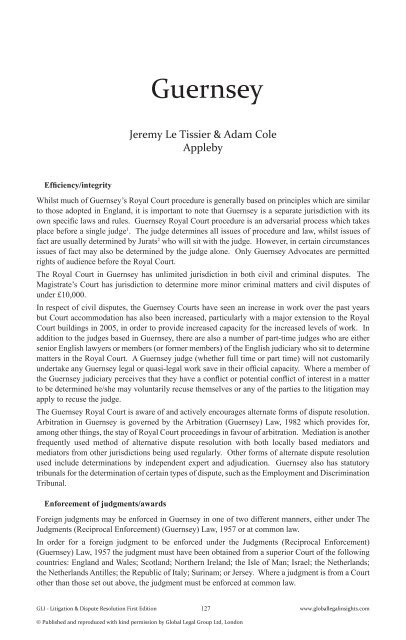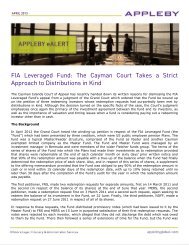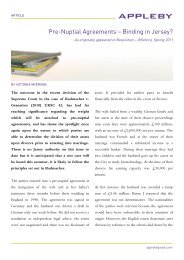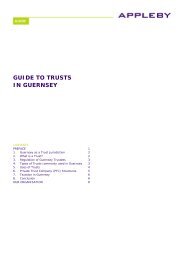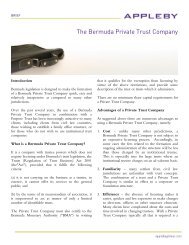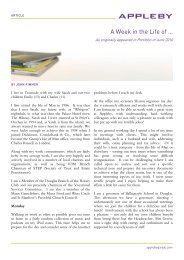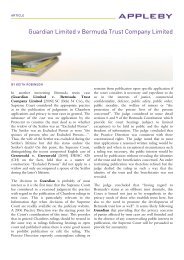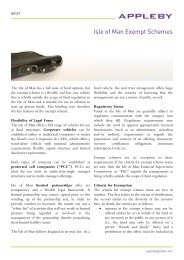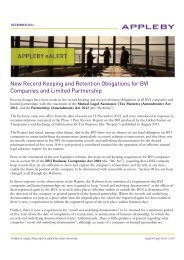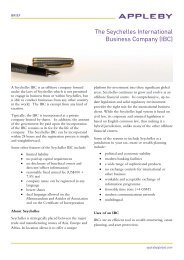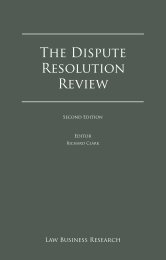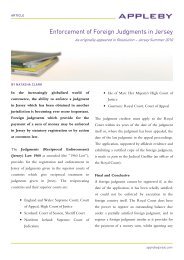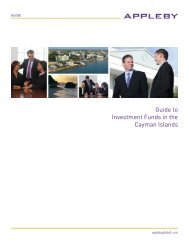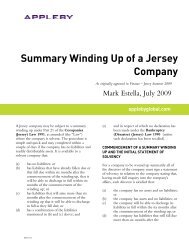Litigation & Dispute Resolution - Appleby
Litigation & Dispute Resolution - Appleby
Litigation & Dispute Resolution - Appleby
Create successful ePaper yourself
Turn your PDF publications into a flip-book with our unique Google optimized e-Paper software.
Guernsey<br />
Jeremy Le Tissier & Adam Cole<br />
<strong>Appleby</strong><br />
Efficiency/integrity<br />
Whilst much of Guernsey’s Royal Court procedure is generally based on principles which are similar<br />
to those adopted in England, it is important to note that Guernsey is a separate jurisdiction with its<br />
own specific laws and rules. Guernsey Royal Court procedure is an adversarial process which takes<br />
place before a single judge 1 . The judge determines all issues of procedure and law, whilst issues of<br />
fact are usually determined by Jurats 2 who will sit with the judge. However, in certain circumstances<br />
issues of fact may also be determined by the judge alone. Only Guernsey Advocates are permitted<br />
rights of audience before the Royal Court.<br />
The Royal Court in Guernsey has unlimited jurisdiction in both civil and criminal disputes. The<br />
Magistrate’s Court has jurisdiction to determine more minor criminal matters and civil disputes of<br />
under £10,000.<br />
In respect of civil disputes, the Guernsey Courts have seen an increase in work over the past years<br />
but Court accommodation has also been increased, particularly with a major extension to the Royal<br />
Court buildings in 2005, in order to provide increased capacity for the increased levels of work. In<br />
addition to the judges based in Guernsey, there are also a number of part-time judges who are either<br />
senior English lawyers or members (or former members) of the English judiciary who sit to determine<br />
matters in the Royal Court. A Guernsey judge (whether full time or part time) will not customarily<br />
undertake any Guernsey legal or quasi-legal work save in their official capacity. Where a member of<br />
the Guernsey judiciary perceives that they have a conflict or potential conflict of interest in a matter<br />
to be determined he/she may voluntarily recuse themselves or any of the parties to the litigation may<br />
apply to recuse the judge.<br />
The Guernsey Royal Court is aware of and actively encourages alternate forms of dispute resolution.<br />
Arbitration in Guernsey is governed by the Arbitration (Guernsey) Law, 1982 which provides for,<br />
among other things, the stay of Royal Court proceedings in favour of arbitration. Mediation is another<br />
frequently used method of alternative dispute resolution with both locally based mediators and<br />
mediators from other jurisdictions being used regularly. Other forms of alternate dispute resolution<br />
used include determinations by independent expert and adjudication. Guernsey also has statutory<br />
tribunals for the determination of certain types of dispute, such as the Employment and Discrimination<br />
Tribunal.<br />
Enforcement of judgments/awards<br />
Foreign judgments may be enforced in Guernsey in one of two different manners, either under The<br />
Judgments (Reciprocal Enforcement) (Guernsey) Law, 1957 or at common law.<br />
In order for a foreign judgment to be enforced under the Judgments (Reciprocal Enforcement)<br />
(Guernsey) Law, 1957 the judgment must have been obtained from a superior Court of the following<br />
countries: England and Wales; Scotland; Northern Ireland; the Isle of Man; Israel; the Netherlands;<br />
the Netherlands Antilles; the Republic of Italy; Surinam; or Jersey. Where a judgment is from a Court<br />
other than those set out above, the judgment must be enforced at common law.<br />
GLI - <strong>Litigation</strong> & <strong>Dispute</strong> <strong>Resolution</strong> First Edition 127 www.globallegalinsights.com<br />
© Published and reproduced with kind permission by Global Legal Group Ltd, London


